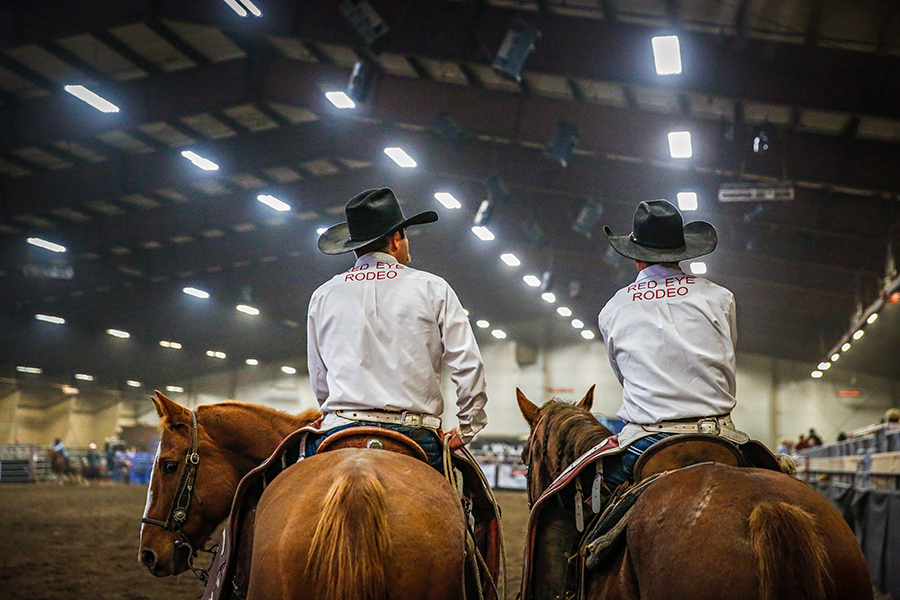An illness that affects equine animals with often fatal consequences was recently confirmed in multiple Flathead County horses, prompting the Montana Department of Livestock to urge caution among area horse owners and leading to the cancellation of two events in Kalispell.
The precautions are an effort to curtail the spread of a disease known as equine herpesvirus myeloencephalopathy (EHM), an illness caused by the equine herpesvirus (EHV-1). On Jan. 31, the Department of Livestock issued a press release urging the cancellation of equine events and recommending that horse owners limit travel and monitor their animals for symptoms through Feb. 6, which is when the incubation period expires. According to the state agency, the recommendations are based on cases involving five horses from three separate premises that recently attended at least two area events.
Of the five horses with confirmed or suspected cases, four have been euthanized due to the severity of the disease, according to the state agency, while the fifth animal is exhibiting mild clinical signs and is under quarantine. EHV-1 is a potentially serious disease that can cause respiratory or neurologic disease in affected animals. EHM is the disease’s neurologic form, which is often fatal.
Montana State Veterinarian Dr. Marty Zaluski said three of the cases were confirmed through lab testing and that, as of Feb. 2, there had been no increase in the number of cases.
Even so, Zaluski said horse owners who have attended events in the Flathead Valley in recent weeks should monitor animals for fever as well as signs of neurological issues, including lack of coordination, difficulty walking, weakness, paralysis, inability to stand, poor tail tone and difficulty urinating. The veterinarian said owners should also be on the lookout for respiratory symptoms, including a cough, nasal discharge, lethargy and decreased appetite.
One classic presentation of the disease includes hind limb weakness, which can result in horses “dog sitting,” Zaluski said, explaining that it’s believed the virus attacks the spinal cord somewhere near the hind legs.
EHV-1 can be transmitted between equine animals through inhalation of droplets from coughing and snorting but can also be spread through contact with common water sources, shared equipment, feeders, tie-outs and through environmental contact, where the virus can remain viable for several weeks. People can also transmit the virus, often through poor hand washing or the use of equipment.
If owners are concerned about their animals, Zaluski advised them to contact a local veterinarian, which is who first alerted the Department of Livestock of the suspected cases.
The virus has an incubation period of 14 days, which informed the Livestock Department’s recommendation that events be cancelled through Feb. 6.
Zaluski said it’s not often that his agency issues an advisory about EHV-1; however, the department has issued recent advisories about other animal diseases, including highly pathogenic avian influenza.
The veterinarian said at least two events were linked to the cases, though he declined to specify which events. Because some horses traveled to other events since their exposures, Zaluski said identifying the events could give the public a false sense of security.
Referring to horse owners in Kalispell and the greater Flathead Valley, Zaluski said he thinks horses are at a greater risk if they’ve gathered with horses from multiple sources in the past two weeks, and he encouraged people to monitor those animals more closely. He also encouraged owners to take biosecurity measures, including separating traveling horses from resident horses. Other measures owners can take include separating feed and water buckets.
Zaluski said he realizes such measures cost money and require additional time, but he warned horse owners against complacency.
“I would probably say this is not the time to get lax about some of these commonsense practices to prevent spread of infection from one horse to another,” he said.
There is a vaccination for equine herpesvirus, which reduces severity of illness and likely decreases viral shedding that leads to the spread of disease. But the vaccine has limited efficacy against the neurological symptoms that occasionally accompany an EHV-1 infection, Zaluski said.
Earlier this week, Brash Rodeo in Kalispell announced it would cancel two upcoming events in its 2022-20223 Winter Rodeo Series that were scheduled for Feb. 3-4. The rodeo events would have likely brought 100 horses or more to the competition, and that’s excluding rough stock, according to Vance Brash, the owner of Brash Rodeo.
“This one potentially could be bad. Everything that I’ve been told, they think it’s pretty isolated for as many horses as we have in the Valley,” Brash said on Feb. 1. “I don’t know exactly what the numbers are, but I’m guessing we’ve probably got as many horses in our county as anybody in the state, so it could be bad if it was to go unchecked.”
Brash said he’d spoken with a local veterinarian and Assistant Veterinarian Tahnee Szymanski before deciding to cancel out of concern that infected horses could show up to the rodeo.
“And we just decided that it’s probably best not to add fuel to the fire,” Brash said.
Brash Rodeo’s winter series events include bareback, saddle bronc, bull riding, ranch bronc, barrel racing, breakaway roping, team roping, chute dogging, peewee barrels, tiny tot barrels, steer riding, junior breakaway and junior barrels.
The rodeo is scheduled to resume events on Feb. 17 and Feb. 18, and Brash said the plan is to go forward unless there is a major development. The rodeo does have a cancellation policy where tickets can be exchanged for a future event, and Brash said it’s issued some refunds for people who are unable to come at a later date.
“It’s an unfortunate chain of events, but life goes on. We’ll survive,” Brash said. “Like I said, our goal was to not take the chance of making it worse.”
